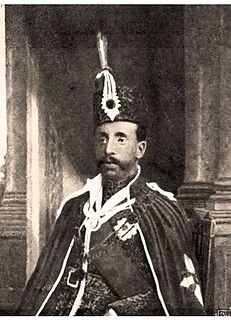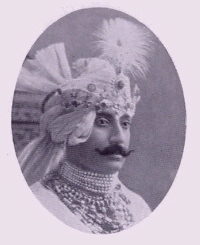Related Research Articles

The Most Eminent Order of the Indian Empire is an order of chivalry founded by Queen Victoria on 1 January 1878. The Order includes members of three classes:
- Knight Grand Commander (GCIE)
- Knight Commander (KCIE)
- Companion (CIE)
Taluqdars or Talukdar, were aristocrats who formed the ruling class during the Delhi Sultanate, Bengal Sultanate, Mughal Empire and British Raj. They were owners of a vast amount of lands, consistently hereditary, and were responsible for collecting taxes. The Taluqdars played helpful roles in the progression of Indian architecture and Indian economy during the reign of Emperor Shah Jahan and Aurangzeb, particularly in Bengal Subah, the most economically developed province in South Asia.
Madrasatul Waizeen or Madrasatul Waezeen or Madrasat al-Wa'izin, founded in 1919, is an old centre of Twelver Shia education in the city of Lucknow, India. Many of the clerics attend this school after they finish their graduate educations in other Shia seminaries to strengthen their oratory and preaching skills. It is well-known for the valuable manuscripts in its library.
The All India Muhammadan Educational Conference was an organisation promoting modern, liberal education for the Muslim community in India. It was founded by Sir Syed Ahmed Khan, also the founder of the Aligarh Muslim University. All India Mumammadan Educational Conference was the origin of the All-India Muslim League. The Muslim League was born in the 20th session of All India Muhammadan Educational Conference, which was established by Syed Ahmed Khan in Aligarh in 1886. Muhammadan Educational Conference used to hold its annual meetings in various cities where, by the co-operation of local Muslims, steps were taken for the progress of education.

Mahmudabad, also known as Mahmudabad Awadh is a town and a municipal board in Sitapur district in the Indian state of Uttar Pradesh.

The Imperial Legislative Council (ILC) was the legislature of the British Raj from 1861 to 1947. It was established under the Charter Act of 1853 by providing for the addition of 6 additional members to the Governor General Council for legislative purposes. Thus, the act separated the legislative and executive functions of the council and it was this body within the GG council which came to known as the Indian/Central Legislative Council. In 1861 it was renamed as Imperial Legislative Council and the strength was increased.

Nawab Sir Muhammad Mazharuddin Khan Bahadur, commonly known as Sir Asman Jah or Nawab Sir Asman Jah Bahadur, was an Indian noble who served as Prime Minister of Hyderabad from 1887 to 1894. A member of the powerful Paigah family, He Was a grandson of His Highness the Nizam Nawab Sikander Jah, Asaf Jah III And he was married to parwarish unisa begum daughter of Afzal-ud-Daulah 5th nizam of Hyderabad State, Asman Jah built the Asman Garh Palace, Basheer Bagh Palace, saroonagar palace and Mahboob Chowk Clock Tower. He also represented Nizam Mahbub Ali Khan at the Golden Jubilee of Queen Victoria and played as regent to Mahboob Ali Khan.

Nawab Sir Sayyid Hassan Ali Mirza Khan Bahadur was the eldest son of Mansur Ali Khan, the last Nawab of Bengal. He succeeded his father, Mansur Ali Khan, as the first Nawab Bahadur of Murshidabad as the title of Nawab Nazim of Bengal was abolished in 1880. His installation ceremony was performed in the Throne Room of Hazarduari Palace on 27 March 1883 by Sir Rivers Thompson, the Lieutenant-Governor of Bengal. The sanad conferring the hereditary title of Nawab Bahadur of Murshidabad was however dated 17 February 1882. At his death in 1906, he was succeeded by his son, Wasif Ali Mirza.

Sayyid Sir Wasif Ali Mirza Khan Bahadur was the Nawab of Murshidabad during 1906–1959. Sir Wasif Ali Mirza was educated at Sherborne School, Rugby School and later at Trinity College. He succeeded his father Hassan Ali Mirza Khan Bahadur at his death on 25 December 1906. On 11 December 1931, Wasif Ali was forced to surrender the administration of his estates to the Government of India after incurring a debt of ₹19 lakhs. On 15 August 1947, the Radcliffe Award allotted the district of Murshidabad to Pakistan and the flag of Pakistan was hoisted at the Hazarduari Palace but within two days the two dominions exchanged Khulna, which is now in Bangladesh, and then the flag of India was hoisted at the grand palace on 17 August 1947. The Government of India also resumed him all his estates in 1953. Wasif Ali was also the founder and president of the Hindu–Muslim Unity Association in the year 1937, named Anjuman-e-Musalman-e-Bangla, which promoted Hindu–Muslim unity. The Nawab also built the Wasif Manzil.

Khan Bahadur Raja Jahandad Khan, (1843–1906) was an Indian politician and Chief of Gakhars and a descendant of Sultan Sarang Khan, King of Potohar.

Lieutenant Colonel Saeed ul-Mulk Nawab Sir Muhammad Ahmad Said Khan, Nawab of Chhatari also generally referred to as Nawab of Chhatari was Governor of the United Provinces, Chief Minister of United Provinces, President of the Executive Council of the Nizam of Hyderabad and Chief Scout of India.
Nawab Sir Muhammad Faiyaz Ali Khan Bahadur (1851–1922) was a Nawab of Pahasu, a member of the Governor General's Council of the United Provinces of Agra and Oudh and Member of the Legislative council of the United Provinces.
Mohammad Amir Ahmed Khanراجا صاحب محمود آباد, titled as the Raja of Mahmudabad was a prominent politician and leader of the All India Muslim League, during the Pakistan Movement.
Maharaja Sir Mohammad Ali Mohammad Khan, Khan Bahadur, KCSI, KCIE was the Raja of Mahmudabad from 28 June 1903 to 23 March 1931 and a noted politician, zamindar of British India.

The Oudh State was a princely state in the Awadh region of North India until its annexation by the British in 1856. The name Oudh, now obsolete, was once the anglicized name of the state, also written historically as Oudhe.
Raja of Mahmudabad is the title used by taluqdars of Mahmudabad Estate. The term may refer to following individuals:
The Aligarh Movement was the push to establish a modern system of Western–style scientific education for the Muslim population of British India, during the later decades of the 19th century. The movement's name derives from the fact that its core and origins lay in the city of Aligarh in Northern India and, in particular, with the foundation of the Muhammadan Anglo-Oriental College in 1875. The founder of the oriental college, and the other educational institutions that developed from it, was Sir Syed Ahmed Khan. He became the leading light of the wider Aligarh Movement.

Ali Khan Mahmudabad,, is an Indian historian, political scientist, writer, columnist, occasional poet, and assistant professor of both history and political science at Ashoka University, India. He is the grandson of Mohammad Amir Ahmad Khan, the last Raja of Mahmudabad,
Kohra was an estate (taluqdari) of Oudh, British India. The taluqdari was controlled by Bandhalgoti clan of Rajputs. Now it is part of Amethi district in Uttar Pradesh, India.
References
- 1 2 Lethbridge, Roper (1893). The golden book of India : a genealogical and biographical dictionary of the ruling princes, chiefs, nobles, and other personages, titled or decorated of the Indian empire (illustrated, reprint ed.). Delhi: Aakar Books. p. 331. ISBN 9788187879541 . Retrieved 20 August 2014.
- 1 2 3 "Mahmudabad". Archived from the original on 4 March 2016. Retrieved 20 August 2014.